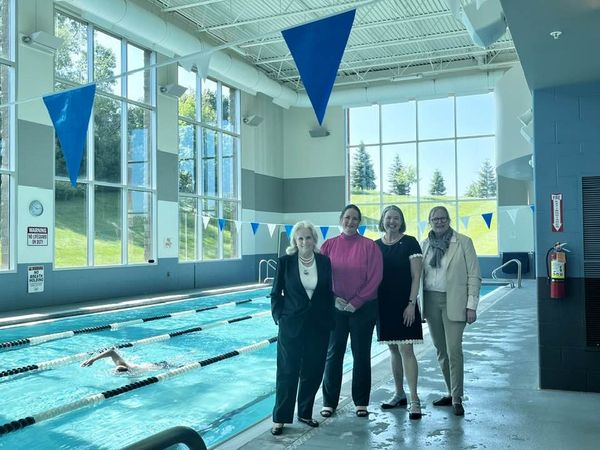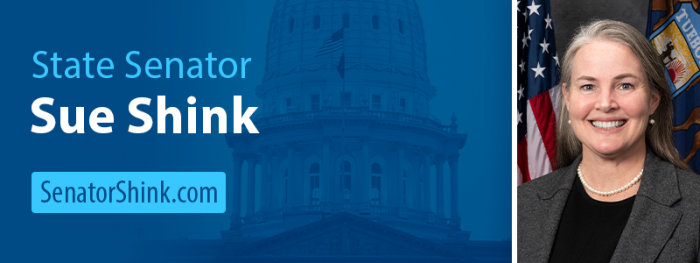Dear Neighbor,
I hope you had a wonderful and relaxing Memorial Day and were able to enjoy the day with family and loved ones. As the weather is getting warmer and bringing about seasonal change, we’ve had several significant legislative wins that will bring positive changes for Michiganders. I’m excited to share updates on these achievements with you below.
The Michigan Senate and the House have both passed their Fiscal Year 2025 state budget proposals and are now ready to negotiate with the governor’s office to ensure that we are directing our state dollars towards our people and the places we call home. This newsletter will continue to serve as a great update on what we’re accomplishing here in Lansing on your behalf.
As always, if you or someone you know would like to provide feedback about what’s happening in Lansing or needs assistance of any sort, feel free to reach out to my office. You can email us at sensshink@senate.michigan.gov or call (517) 373-2426. And don’t forget to visit my official Facebook page for the latest updates.
Sincerely,

Sue Shink
State Senator
District 14
Legislative Updates
Working to Deliver Innovative “Building up Michigan” State Budget

Last year marked a significant milestone for Michigan Democrats as we capitalized on the first trifecta in 40 years to spearhead a transformative budget — directing vital resources into historically neglected sectors like infrastructure, education, and local communities. This comprehensive budget, encompassing various offices, departments, initiatives, projects, and programs, follows an annual funding cycle, necessitating the State Legislature to craft a new budget each year.
Crafting this state budget is a collaborative effort involving negotiations between both legislative branches and the governor, resulting in a new state budget being signed into law each year to pay for the things our residents, schools, communities, businesses, local governments need to make a Michigan that works for everyone.
Currently, we’re in an exciting moment with our budget process, continuing the transformative investments of the previous year and taking an innovative approach to addressing the needs of all Michiganders. Highlights of our “Building Up Michigan” budget proposal include record school funding, increased access to community college for students, significant funding for local communities and efforts to lower costs for state residents.
As we work to deliver a final budget by the end of June, I encourage you to learn more about the process and the investments we’re looking to make to support communities across Michigan — read more here.
Senate Democrats Introduce Bills to Codify Capitol Weapons Ban
Earlier this month, Sen. Dayna Polehanki (D-Livonia) and Sen. Rosemary Bayer (D-Keego Harbor) introduced Senate Bills 857 and 858, respectively, which would codify a weapons ban enacted by the Michigan State Capitol Commision in 2023 and expand it to include the state Senate and House office buildings. This legislation is vital to protecting all visitors to our State Capitol, especially children and school groups, and making sure people aren’t intimidated out of participating in democracy when they attend committee hearings and visit their lawmakers.
The legislation also would maintain an exemption allowing sitting members of the Legislature to carry concealed firearms. The bills were referred to the Senate Civil Rights, Judiciary and Public Safety Committee, on which I serve as Vice Chair.
70th Anniversary of Brown vs. Board of Education Decision

May 17 marked the 70th anniversary of the Brown vs. Board of Education milestone Supreme Court decision which ruled that separating children in public schools based on race was unconstitutional. While we honor this important victory in our country’s history and the civil rights progress that has been made thus far, let us also recommit to the necessary work ahead to make our systems and communities more fair, equitable and inclusive for all.
Senate Democrats Fight to Expand Access to Mental Health Care
Throughout our state, communities are grappling with having too little access to mental health support — a crisis particularly affecting young Michiganders and our veterans. That’s why Senate Democrats took action and made critical investments in the 2024 State Budget to address this gap in coverage so all Michigan residents who need assistance can access it. A few highlights of the investments we have made so far in mental health care include:
- $280 million for certified community behavioral health clinics to expand access to care.
- $328 million in the education budget to address the mental health and safety concerns of students and teachers.
- $1.2 million for suicide prevention programs to help military veterans and their families.
As we recognized May as Mental Health Awareness Month and as we continue to craft our budget for 2025, my colleagues and I are committed to ensuring every person in our state can access essential services and programs to improve their mental health and overall well-being. Together, we can break down barriers to care and create a healthier, more resilient Michigan.
In Recent News
$20 Million Available for Michigan’s First-Ever Environmental Justice Impact Grants
Michigan’s Department of Environment, Great Lakes, and Energy’s (EGLE) Office of the Environmental Justice Public Advocate (OEJPA) is launching a $20 million Environmental Justice Impact Grant program.
My Democratic colleagues and I secured funding for this program in our 2024 state budget to help reduce environmental health burdens in Michigan’s environmental justice communities.
Applications are now open for place-based, equity-focused projects.
Eligible projects include:
- Improving local public health.
- Monitoring pollution.
- Removing blight.
- Cleaning up contamination.
- Enhancing indoor air quality in schools and childcare facilities.
Federally recognized tribes, community-based nonprofits, local governments, schools, and childcare centers can apply for up to $500,000. The deadline for applications is July 15, 2024, with funds awarded by early September 2024.
Loving Homes Needed During Foster Care Month and All Year Long
May is Foster Care Month, and the Michigan Department of Health and Human Services (MDHHS) wants to spread the word that more loving foster families are needed to temporarily care for children while the state works to reunify them safely with their parents.
Michigan has approximately 10,000 children in foster care, and temporary foster homes are needed for children of all ages, especially teens, sibling groups, and youth who have special needs. These children have been victims of abuse and neglect and need a nurturing environment until they can be safely reunified with their parents or — in a smaller number of cases — until they can find adoptive homes when it’s not safe for them to return home.
MDHHS has shared several stories about people who have made a difference in the lives of youth in Michigan in Faces of Foster Care. To learn more about foster care, visit Michigan.gov/HopeforaHome.
EPA Awards Michigan with Historic Investment in Solar Energy for Low-Income Residents
Local and state leaders from the Michigan Department of Environment, Great Lakes, and Energy (EGLE), Michigan Infrastructure Office (MIO), City of Detroit, community organizations and state legislators are celebrating a historic $156 million investment in solar energy by the U.S. Environmental Protection Agency (EPA) to the state of Michigan to accelerate the deployment of community and rooftop solar for thousands of low-income households across the state.
The initiative, known as the Michigan Solar for All (MISFA) program, aims to reduce utility costs for families, promote job creation, and strengthen Michigan’s advanced clean energy sector — all while moving the state toward its MI Healthy Climate Plan goals. The program is expected to make a substantial impact by providing low-income households across Michigan with access to affordable renewable energy, reducing their energy bills by up to 20%.
To stay informed with MISFA updates, please sign up via the MI Solar for All Interest Form.
In the Community
Dexter Senior Center

I had the honor of attending a ribbon cutting on May 20 at the Dexter Wellness Center/Dexter Senior Center with State Representatives Jennifer Conlin and Carrie Rheingans and U.S. Representative Debbie Dingell. This is what happens when community members and elected officials work together to bring money home to serve the community! I want to acknowledge the incredible work that the Dexter School District and many residents have put in to make this project successful.
Genealogical Society of Washtenaw County’s 50th Anniversary
Congratulations on the 50th anniversary of the Genealogical Society of Washtenaw County! Their work transcribing headstones, accumulating and sharing family histories and assisting those learning more about their families has touched thousands of people. I was pleased to present a special tribute from the State of Michigan at their celebration on May 19, with Nancy Howard, GSWC President.
Upcoming Events
Mark your calendar for Friday, June 14! I’ll join a panel discussion hosted by the Washtenaw County Commission on Aging and led by U.S. Representative Debbie Dingell on Safe Aging. We’ll learn about community resources for senior safety, listen to residents’ concerns, and answer questions. I hope to see you there!
What: Safe Aging Townhall
When: June 14, 2024, 1:00 – 4:00 p.m.
Where: Chelsea Senior Center, 512 Washington St., Chelsea, MI 48118
Resources
Essential Resources for Mental Health
With one in five Americans and nearly 1.5 million Michiganders experiencing mental health issues each year, it’s important to remind ourselves to care for our mental and emotional health. If you find yourself emotionally struggling or experiencing a mental health crisis, please be sure to utilize the following resources and remember — you matter!
Crisis Lines
- 988 Suicide and Crisis Lifeline: 988 is a 24/7 toll-free nationwide hotline that provides confidential and compassionate care for anyone struggling with behavioral health issues, emotional distress or substance use crisis. If you or someone you know is struggling or in crisis, help is available. Call or text 988 or visit the Lifeline Chat to connect with a trained crisis counselor.
- Veterans Crisis Line: The Veterans Crisis line provides veterans and their family members with 24/7, confidential support. To connect, call 1-800-273-8255 and press 1 or text 838-255. You do not have to be enrolled in VA benefits or health care to call.
- Trevor Lifeline: The Trevor Project has trained counselors who understand the challenges young people in the LGBTQ community face and are available for support 24/7. Call 1-866-488-7386, text 678-678, or click here to speak with a crisis counselor.
Locating Treatment Services
- Michigan 211: If you need assistance locating long-term mental health resources, talking through a problem, or exploring mental health treatment options, call 211 or visit mi211.org to speak with a live person who can help. All conversations are confidential, can be made anonymously, and are available in 180 languages upon request.
- Substance Abuse and Mental Health Services Administration: Visit FindTreatment.gov, a confidential and anonymous resource, to locate treatment facilities for mental and substance use disorders near you.
- Michigan Community Mental Health Services Programs: CMHSPs provide a comprehensive range of services and supports to children, adolescents and adults with mental illnesses, developmental disabilities and substance use disorders in all 83 Michigan counties. Find your local program here.
Low-Interest Financing Available to Replace Septic Systems
I am excited to share this recent announcement that Michigan’s Department of Environment, Great Lakes, and Energy (EGLE) and Michigan Saves have launched the Septic Replacement Loan Program (SRLP). This program provides Michigan homeowners with low-interest financing options to replace their failing or near-failing septic systems.
Maintaining a properly functioning septic system is vital for a healthy home and environment. A well-functioning septic system keeps families safe from exposure to harmful bacteria, prevents contamination of drinking water and groundwater, and keeps our lakes and rivers safe for recreation.
The program will provide low-interest financing options for loans up to $50,000. Find out more in the official announcement: here. For more information about the SRLP, to find a Michigan Saves authorized contractor, and to begin the financing process for septic system replacement, please visit http://MichiganSaves.Org/Septic

